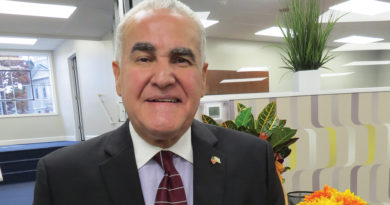Pointed Arguments – Despite Controversies, Vaccines Remain a Critical Line of Defense
It’s like the end of a horror movie, when viewers think the villain is dead – only to see him rise up one last time.
Meet the villain known as measles. Due largely to an inoculation developed in the 1960s – now commonly administered to young children along with mumps and rubella vaccines in a combined vaccine known as MMR — the U.S. and the United Kingdom had both categorized measles as effectively ‘eliminated’ by the turn of the millennium.
That’s not the case anymore. Child deaths from measles worldwide fell 71{06cf2b9696b159f874511d23dbc893eb1ac83014175ed30550cfff22781411e5} from 2000 to 2011, according to the Measles & Rubella Initiative, a partnership of global-health groups.
Most of that improvement has taken place in developing countries. But cases are rising in the U.S. and especially Europe. The 117 U.S. cases reported in the first half of 2013 alone are up from 54 in all of 2012. Meanwhile, England reported 1,168 cases in 2013 through May, up 64{06cf2b9696b159f874511d23dbc893eb1ac83014175ed30550cfff22781411e5} from the same time a year earlier. The culprit, public-health groups say, is an increased refusal by many parents to have their children vaccinated, citing safety fears, and particularly a belief that vaccinations can cause autism.
“Even though it’s been disproven over and over again on a scientific level, we definitely have that myth circulating in the community,” said Dr. Stephanie Carlin, a pediatrician at High Street Health Center, a Baystate Health practice in Springfield. She said some parents worry about mercury used in the vaccine preservative, which today has been eliminated from early-childhood vaccines like the MMR.
“We also try to educate about the nature of autism, that it tends to be diagnosed around the same time we’re given vaccines. That’s why there was this connection made between the MMR vaccine and autism,” she explained. “But autism is multi-factoral. We think there’s a strong genetic component, and we try to broaden parents’ understanding of autism as a disease that’s not connected to a vaccine.”
What’s happening in Wales is a strong argument for vaccines. Anti-vaccination sentiment ran particularly strong there in the late 1990s after a now-discredited study by Dr. Andrew Wakefield (more on that later). A measles outbreak infected 1,219 people in southwest Wales between November 2012 and July 2013, compared with 105 cases in all of Wales in 2011. Many victims were teenagers whose parents refused vaccines for their infant children.
“Despite the fact that it’s one of the greatest health measures ever invented by man or woman, there seems to still be a small residue of humanity that objects to the very idea of immunization,” Dr. Dai Lloyd, a Welsh physician who treated many of the recent measles cases, told the Wall Street Journal. “If you go around the cemetery, you can see the historical evidence of childhood slaughter from pre-immunization days.”
Different Perspective
Part of the problem, Carlin told HCN, is precisely that today’s young parents didn’t grow up surrounded by that carnage, so they don’t take seriously the potential damage once-common childhood diseases can cause.
“By the age of 2, you could potentially prevent 14 serious diseases in children, which is incredible,” she said. “But parents today haven’t seen the devastating effects of these diseases because we don’t see them anymore. Well, some we do; although we vaccinate for whooping cough, chicken pox, and and measles, outbreaks could rise up again if we didn’t.”
What parents are seeing today, however, is a drastic uptick in autism-spectrum diagnoses.
Enter Wakefield, who first suggested a vaccine-autism link in 1997 when he was a researcher at London’s Royal Free Hospital.
Wakefield was the lead author of a 1998 study, published in the Lancet, which reported on 12 children who allegedly developed gastrointestinal problems and developmental disorders, including autism bowel disorders, after being vaccinated. Alleging a possible connection with the MMR, he publicly advocated for, at the very least, separating the components of the injections by a year or more.
However, the section of the study dealing with an autism link was subsequently retracted by 10 of the paper’s 13 authors. In 2004, following an investigative report by journalist Brian Deer — claiming that children may have been subjected to unnecessary lumbar punctures and colon biopsies, including one colonoscopy that caused the child life-threatening perforations of the bowel — the British General Medical Council (GMC) launched an inquiry into allegations of serious professional misconduct against Wakefield and two former colleagues. The GMC also accused Wakefield of suppressing and falsifying data.
In 2009, an investigation by London’s Sunday Times determined that Wakefield had “changed and misreported results in his research, creating the appearance of a possible link with autism,” citing evidence obtained by the newspaper from medical records and interviews with witnesses. The newspaper also reported that the rates of inoculation in the U.K. fell from 92{06cf2b9696b159f874511d23dbc893eb1ac83014175ed30550cfff22781411e5} to below 80{06cf2b9696b159f874511d23dbc893eb1ac83014175ed30550cfff22781411e5} after the publication of Wakefield’s study, and that confirmed cases of measles in England and Wales rose from 56 in 1998 to 1,348 in 2008, with two child fatalities.
In 2010, the Lancet formally retracted Wakefield’s 1998 paper, and the GMC revoked his license to practice medicine in the U.K. He now practices in the U.S., where a significant number of adherents, many of them parents of autistic children, continue to claim a link between vaccinations and autism.
Dan Olmsted, a blogger with the anti-vaccination website Age of Autism, is one strong voice in the movement (whose most noted celebrity backer has been Jenny McCarthy, who claims that vaccines caused her son’s autism). It’s a varied community — some adherents want mercury out of all vaccines (it’s still used in flu vaccine), others want the MMR vaccine components separated, and others question the necessity of giving young children so many vaccines — but a belief in the autism link is largely common ground.
“One thing I do know for sure,” Olmsted writes, “is that the autism epidemic reflects a fundamental betrayal of American families. Doctors and journalists and judges and scientists, among many others, have failed in their duty to listen to the real stories of real people, real families, and instead have thrown in their lot with the bigs — big medicine, big pharma, big media, big government, big money — and left families to fend for themselves.”
Notably, however, the major advocacy organization Autism Speaks is forcefully on record that studies examining possible links between vaccinations and a rise in autism have not found a link between the two.
“It remains possible that, in rare cases, immunization may trigger the onset of autism symptoms in a child with an underlying medical or genetic condition,” the organization notes, explaining that it is funding studies on the underlying biology of autism, including studies to better understand medical and genetic conditions associated with autism – as well as research on associations between autism and a wide range of non-genetic, environmental, factors, including vaccination history.
In the meantime, “we strongly encourage parents to have their children vaccinated for protection against serious disease. We recognize that some parents still have concerns about vaccines, particularly if they have a child or relative with autism. We urge them to find a health practitioner who will consider their concerns and help them ensure the well-being of their child. Establishing open communication and trust with a physician who understands each child and family is the best strategy for keeping children healthy.”
Fighting Back
However, measles outbreaks continue to pop up occasionally, including the reported infection of at least 15 people in Texas affiliated with a megachurch whose leader, Kenneth Copeland, advocates against vaccines; 12 of those people were not vaccinated as children.
James Goodson, the lead measles expert at the U.S. Centers for Disease Control and Prevention, calls the disease “the canary in the coal mine,” telling the Wall Street Journal that people who refuse one vaccine may be rejecting others as well, setting communities up for outbreaks of other dangerous diseases that are slower to propagate, such as diphtheria and whooping cough.
“The really important concept is that, by vaccinating your child, you’re protecting your community,” Carlin told HCN. “You’re not just making decisions for your kid. If your kid didn’t get vaccinated and gets chicken pox and is around a 3-month-old baby who has not been vaccinated yet, he can give that 3-month-old chicken pox, which can be devastating, depending on the severity of the illness. This is a public-health issue.”
Before 1963, the U.S. saw up to 4 million measles cases annually — a disease that kills about 1 in 1,000 sufferers and can pose respiratory complications, hospitalizations, and seizures for others. Carlin said it’s not an environment the healthcare industry wants to see re-emerge, even in small pockets.
“A lot of parents are asking to separate the vaccines instead of giving them so many in one day — spread them out a month at a time, that kind of thing,” she said. “We’re trying to discourage that as well; if they’re not following the schedule recommended, it’s possible they could be delaying the immune response and not protecting their children as well as they should be protected.”
As for those who question the effect of the antigens in vaccines — substances in vaccines that cause the body to produce antibodies, proteins that help fight off infections — vaccination adherents note that the body is exposed to antigens all the time in the form of bacteria and viruses.
“We try to teach them they’re not overloading their immune system by giving them the vaccines scheduled for that day,” Carlin said. “Our immune system is exposed to millions of antigens on a daily basis, and this very small exposure to vaccines is so little compared to what the daily exposure is. You’re not overloading their system by vaccinating.”
She concedes that the vaccination schedule has expanded over the years, with inoculations required for children at various stages of life, from infancy to grade school, middle school, and even college.
“Every year it seems to be changing. The long and short of it is, pediatricians view vaccinations as one of the best things you can do for the long-term health of your children — not only to protect them against potentially serious diseases, but also to protect their classmates, family members, and the community.”





Comments are closed.